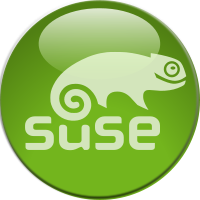FOSS Week in Review
There was plenty of FOSS news this week, but in many ways it was just more of the same — the more things change and all that. Unfortunately, some of the news harkens back to the dark ages, when armour clad knights from Redmond seemed to be hiding behind every tree…
 Is Ubuntu the new Novell? It probably wasn’t news to anybody when Microsoft failed to renew it’s deal with SUSE when it expired at year’s end. Many with long memories will remember that way back when SCO was still a viable company, Microsoft inked a deal with Novell, which was then the proud new owner of the SUSE Linux distro. Among other things, the deal gave SUSE users a free pass against getting sued by Microsoft for infringing any of its patents. As part of the deal, Microsoft purchased tons and tons of SUSE support contracts to sell to enterprise customers who might need to keep a Linux machine or two running, which were reportedly given away. Mainly, Microsoft was using SUSE as its official Linux distro, and as a testing ground for Microsoft’s attempts to get Windows to work and play well with Linux.
Is Ubuntu the new Novell? It probably wasn’t news to anybody when Microsoft failed to renew it’s deal with SUSE when it expired at year’s end. Many with long memories will remember that way back when SCO was still a viable company, Microsoft inked a deal with Novell, which was then the proud new owner of the SUSE Linux distro. Among other things, the deal gave SUSE users a free pass against getting sued by Microsoft for infringing any of its patents. As part of the deal, Microsoft purchased tons and tons of SUSE support contracts to sell to enterprise customers who might need to keep a Linux machine or two running, which were reportedly given away. Mainly, Microsoft was using SUSE as its official Linux distro, and as a testing ground for Microsoft’s attempts to get Windows to work and play well with Linux.
These days, Microsoft doesn’t need SUSE anymore, partly because the once number two Linux distro has fallen way down on the list of popular Linux distros, partly due to the old Novell’s ineptitude and partly because of the deal with Microsoft, which as you might imagine, didn’t sit well in FOSS circles. These days, behind the practically-one-and-the-same one-two punch that RHEL/CentOS brings to the enterprise table, there’s a new number two in Ubuntu, with Canonical seemingly intent on replacing the old Novell in the we’ll-sleep-with-Microsoft-if-it-keeps-the-rent-paid department.
Actually, Ubuntu seems to be a cheaper date than SUSE ever was. We’re not hearing anything about millions upon millions of dollars being poured into the Isle of Man the way Microsoft poured money into Utah back when Novell was still hoping for a Netware comeback. Nor are we hearing about Redmond buying thousands of support contracts to sell give away to it’s customers. What we are hearing is partnership after partnership after partnership between the company that loves Linux and the distro that thinks it is Linux.
The latest Microsoft-loves-Ubuntu news came this week, when Microsoft announced it was open sourcing, under the permissive MIT license, its Edge web browser’s JavaScript engine, ChakraCore, with plans to port it to Linux. While this was undoubtedly huge news to the development community, for the rest of us if was primarily just more evidence of how deeply Redmond is trying to reach its tentacles into Linux. But it’s not just Linux that will be the beneficiary of the ChakraCore port. More specifically, it’s “Ubuntu Linux 15.10,” according to Gaurav Seth, Microsoft’s main man on the Chakra project.
I know this isn’t exactly a smoking gun, but when pieced together with Ubuntu’s other Microsoft partnerships…. Maybe the speculators are right by predicting that Microsoft will eventually buy Ubuntu. Stay tuned
Linux in a win over Windows: Meanwhile, the once and future telecom monopoly AT&T has decided to bet on Linux. In an article published Wednesday on BetaNews, we learn that Canonical and AT&T have teamed-up to leverage Ubuntu for the telecom’s cloud, network and enterprise applications.
This announcement has AT&T singing the praises of open technology.
“We’re reinventing how we scale by becoming simpler and modular, similar to how applications have evolved in cloud data centers,” said Toby Ford, who is AT&T’s assistant vice president of cloud technology, strategy and planning. “Open source and OpenStack innovations represent a unique opportunity to meet these requirements and Canonical’s cloud and open source expertise make them a good choice for AT&T”
I guess we’ll hand Canonical a +1 for this feat.
Competition for Android? On Thursday we learned that Samsung, the longtime king of Android devices, has plans to market the Samsung Z3 Tizen Smartphone in a big way in both Russia, the EU and elsewhere. The phone has already been successful with business and government users in Russia, as it’s obtained a security certification for corporate and government use. Now Samsung has plans to take it to Russian consumers as well. In addition, the handset maker will introduce the Tizen device in Indonesia and in ten European markets, perhaps as early as the first quarter of this year.
In case you don’t know, Tizen is a Linux based OS designed to be used on a wide variety of devices, with development supported primarily by Samsung, the Tizen Association, Intel and the Linux Foundation.
Does this mean an eventual move by Samsung away from Android devices, the OS which has become its bread and butter? Who knows. Time will tell.
Another day, another distro: We learned today that KaOS is out with 2016.01, which isn’t really so much a version number — KaOS is a rolling release distro — as an ISO image number. Anyway, it has all the latest features you might need and can be downloaded from the distro’s website…. Also, the GNU folks would like you to know they’ve released blob free Linux-libre 4.4, which as the name implies is a remix of the Linux kernel sans proprietary blobs. Downloads are available on the Phoronix website.
Quick takes: A zero-day vulnerability has been found in the open-source multimedia framework, FFmpeg. The vulnerability, discovered by Maxim Andreev, affects the current version of the software and can be exploited with a specially crafted video file. You can find more details on Softpedia…. Larry Cafiero’s off to sunny Southern California to wear his hat as the head media honcho at SCALE 14x and rub shoulders with the likes of Maddog Hall, Corey Doctorow, Mark Shuttleworth and others. He’s also taking with him his reporters hat, and will be offering extensive coverage of the event here on FOSS Force starting Thursday morning.
One more thing: As we go to press, the FOSS Force bake sale Indiegogo fundraising campaign is at $860 — thank you to those who’ve contributed — which is 23 percent of our goal. We’ve got a lot of great perks, and we really need for this fundraiser to be successful. Please go to our Indiegogo campaign page and make a contribution.
Well, that does it for now. Until next time, may the FOSS be with you…
Christine Hall has been a journalist since 1971. In 2001, she began writing a weekly consumer computer column and started covering Linux and FOSS in 2002 after making the switch to GNU/Linux. Follow her on Twitter: @BrideOfLinux












In defense of Novell and Canonical, making profits off of Linux is hard. Only Red Hat has consistently managed it. I think when Microsoft offered Novell a deal, Novell just saw it as free money and ran with it. Now Novell is out of the picture, and Microsoft decided Canonical was desperate enough for a little money and good publicity, and made a much cheaper offer. And Canonical still took it – because the company is, as far as I know, still in the red.
The world pours a hundred billion dollars into Redmond every year. Novell and Canonical even at their best don’t get a hundred million a year.
I want free software to win, but we have a hell of an uphill battle.
Even if MSFT takes over Linux, no need to panic, we can use BSD .
MHM
Interesting stuff, it is all allover agin, or there is nothing new under hud of the God. Well, it is just against people and freedoms any way. It is like we were slaves, and then we have not been it any more, and now we had to much and some other guis got it.
I am afreaid that Gates comment on this would be, I was not able to indirectly address something, however I am able to inirectly over take some other companies…
BLP…
Why people don’t like Ubuntu, it is OK…
“Even if MSFT takes over Linux, no need to panic, we can use BSD.”
I doubt they could take over thanks to the GPL (although the AGPL would have been safer, in retrospect – but I think it didn’t exist back then). However I believe they can limit its widespread use in the long run.
Correct me if I’m wrong, but the MIT license is permissive, meaning that it’s pretty nice for bait-and-switch (or the 2/3 of Embrace-Extend-Extinguish if you will). There is no imperative to make the changes you’ve made public. So you could have, down the line when enough people are onboard, various “enchancements” and miscellaneous tweaks only found in one version running on one platform, resulting in breakage on other systems, a PitA to maintain and devs simply sticking to the version working on the most machines.
Is it too far fetched?
@PsynoKhi0,
If the project becomes important, the same MIT license allows other people and companies to fork the project. So if Microsoft introduces anything that causes problems on other platform – intentionally or not – if enough people are using the software on Linux or BSD, or even on OS X or some other proprietary operating system – they can just fork the project.
The V8 Javascript engine is already available on any platform under a permissive license, so Microsoft can take anything they want from that anyway. I don’t think this makes it worse.
MIT/BSD licenses give proprietary software developers a leg up, allowing them to build upon open software and focus their limited efforts on extending it in proprietary ways. It encourages bad behavior.
GPL on the other hand encourages good behavior by allowing you to build upon free software only if you intend on reciprocating that freedom. It forces the proprietary builders to look elsewhere for a free lunch.
@Mike,
You’re speaking my language. As far as I know, the only major Javascript engine that has something like the GPL is Mozilla’s “SpiderMonkey” engine, which is under the Mozilla Public License (roughly similar to the Lesser Gnu Public License).
But from what I understand – and I could be wrong – SpiderMonkey is at a disadvantage against V8. In single tab benchmarks, it matches or beats V8. But SpiderMonkey shares more data between tabs than V8, so if you have lots of tabs with lots of Javascript (which I do) then Firefox is noticeably slower and more prone to periodic pauses than Chromium or Chrome.
I don’t know how Microsoft’s Chakra Core manages with multiple tabs.
Hopefully SpiderMonkey or some new GPL/MPL/LGPL project can evolve to match or beat V8 and Chakra Core across the board.
OpenBSD is *not* proprietary and it does not rely on the GPL.
@Henry Kurth,
The OpenBSD and FreeBSD operating systems are not proprietary and they don’t rely upon the GPL. The problem we GPL fans have is that Microsoft (and Google, Apple, Oracle, IBM, etc…) can take any code they want from your the BSD projects.
So it’s not that the projects are bad, or undesirable. The projects are wonderful, and I have nothing against anyone or any company that’s using FreeBSD or OpenBSD. It’s just that the big proprietary companies build their business models *on your backs*.
Hey guys and gals, we’ve got the coolest perk ever for our Indiegogo campaign, and we’re sharing it with you here in the comments section before announcing it on our front page. We’ve heard from you that getting through the captcha when you’re making a comment can sometimes be a pain. Well, now you’ll be able to post comments to our articles simply by typing your comment and clicking “Post Comment.” No captcha or filling in the email text box when you want to make a comment — and you’ll be able to edit your comments after you post them as well, just in case you made a typo.
Our “Frequent Commenters Membership,” available through our Indiegogo fundraiser, gets you your own account on FOSS Force. You login to your account and all of your commenting is captcha free — and the post will automatically go up using the username you give us when we set-up your account. In addition, after we get ten or so of you signed up, each week we’ll offer a discussion topic which will only be available to logged-in members. And down the road, we have even more ideas we might implement.
The memberships are available for a $25 contribution to our Indiegogo fundraising campaign. This is just one way we’ve come up with to say thank you for your support. To claim your membership, just go to our Indiegogo page now and make your contribution!
http://igg.me/at/foss-force/x/10540979
Oh, and whether you make a contribution or not, thank you for being a part of FOSS Force. 🙂